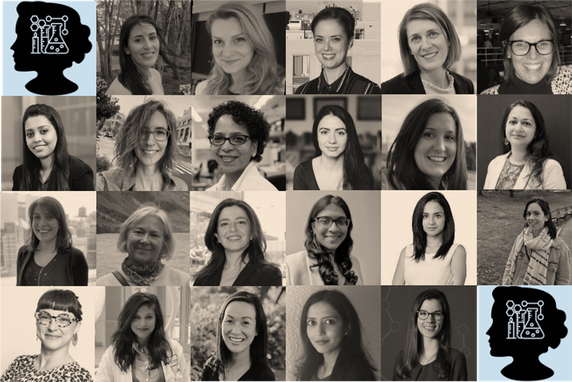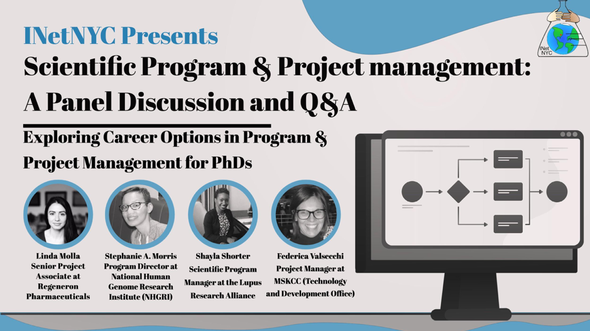|
Words by: Dr Rebecca Caeser Edited by: Dr Lucie Yammine, Dr Vacha Patel and Dr Rinki Saha Women in science have long gone underappreciated. INet-NYC did our part to redress this by hosting a Women in Science month. We featured a female scientist’s story and thoughts on our blog and social media (twitter and instagram) every day for the month of March. We hope many of you walked away from it feeling inspired, relieved that things are changing already, yet still driven for more change. Here are three themes that stuck with us: Motivation One of the themes that ran through all of our interviews was our interviewees love of science. Dr Bhama Ramkhelawon (NYU Langone) spoke for many when she said that her motivation comes from performing “an experiment to address a question - and it works. Feels fantastic. Feels like the first bite of ice cream on a hot summer day”. Many also mentioned that their motivation is driven by a sense of doing something meaningful which is often fuelled by speaking to patients and/or their families. But several argued that doing great science is not enough to progress equality. Dr Linda Molla (Regeneron Pharmaceuticals) believes that we need to shift our thinking about how leaders within science are rewarded. Currently, individual successes are recorded, but we need to put more focus on “how they manage and help employees or trainees to develop to achieve their goals”. These efforts will be vital to achieving greater gender equity, and are often currently unrecognised. As Dr Molla says, addressing “ineffective management practices would overall create healthier academic lab environments and help retain women in science.” Several interviewees advised focusing on your productivity, rather than how many hours you put into a project. Dr Federica Valsecchi argued that "Being “workaholic” does not always mean being productive." A similar sentiment was shared by Dr Sandra Franco Iborra (New York Genome Center) who said that “one of the most dangerous rules is that you can’t have a work-life balance if you want to be a successful scientist”. We ought to let go of feeling guilty when not working 24/7. And Dr Itziar Irurzun Arana (AstraZeneca) had some good advice for staying motivated through adversity: “don’t be afraid of making the wrong choice, making mistakes is part of the path”. Family It’s no secret that women often feel a pressure to choose between starting a family and progressing their career. Dr Gayathri Srinivasan (Emory University) feels that “the roadblocks for women are that the biological clock and the tenure clock or climbing the corporate ladder are exactly at the same time. This makes for hard choices.” Yet, women should not feel like it’s either all science or nothing. Dr Elisa Venturini (Natera) gave some food for thought on this topic: “Mentors and colleagues who value our expertise will not make us choose. Finding that environment will not be easy, but we should not give up our dreams of starting a family, but rather we should focus on finding that workplace where we are valued even more because we have a family”. Our interviewees had some good tips on how to achieve a healthy work-life balance. In prioritising her work, Dr Lilian Lamech (Chemeleon) said “I often re-evaluate based on the needs of the coming weeks and make sure the goals are manageable. It’s also okay to say no." And as Dr Thu Huynh (Midwestern University) told us, “work-life balance means setting boundaries.” But they also argued for deeper structural changes, such as implementing better paternity and maternity leave, allowing for flexible work hours and affordable daycare for all. As Dr Hannah Meyer (Cold Spring Harbor) argues, women can’t fix equality on their own: “the burden of trying to make a change is often placed on the minority group, here women – this takes away from time that can be spent on research.” Visibility
One of the key obstacles to equality in science identified by our interviewees was visibility. Dr Karuna Ganesh (MSK) points out that “girls are steered away from STEM early on.” This lack of role models is damaging and leads to a shortage of women higher up the scientific career ladder. But role models don’t necessarily have to be celebrity scientists. As Dr Linda Molla (Regeneron Pharmaceuticals) said “If we want to impact change, each and every one of us needs to speak up in our workplaces”. Dr Gayathri Srinivasan (Emory University) agrees: “we will all have to come together as a society to improve women’s visibility in science”. Many suggested that we need equal representation and provide opportunities for junior/early career scientists. But to achieve this, there was a general consensus: we need male allies! Dr Alicia Perez Porro (CREAF) argues that “we need men to step down from manels, from all-men selection committees etc, and to fight with us for equal salaries, equal career opportunities, to take an active role for diversity and inclusion in STEM”. Lastly, a general advice that many would have given themselves if they were starting their career today was to look for mentors early on in their career! As Dr Triparna Sen (MSK) argued “The right mentor will guide you to seize opportunities, open doors for you, will be a sounding board as you make difficult career choices and will champion for you”. To dive deeper into all our female scientist life stories and thoughts on this topic, check out full interviews on our blog and also youtube channel!
0 Comments
Words by Dr. Marta Collu Edited by Dr. Laurie Herviou, Dr. Conchi Izquierdo and Dr. Lucie Yammine As scientists, we apply project management principles every day, from planning and leading research activities, to effectively engaging and communicating with people. Yet, Project Management is a discipline on its own, and many scientists have chosen to transition from a bench research position to a management role. You are probably a scientist at the stage of exploring alternative career paths, looking for networking opportunities and to know more about what being a scientific project manager actually is. To help you with it, INet-NYC hosted a virtual career development event on February 23rd, 2021, dedicated to Scientific Program and Project Management. Flyer of the event by Matthew Baffuto The event, featuring four experts in the field, aimed to discuss how to sail to a project management career in a relaxed, conversational atmosphere. INet-NYC board members, Dr. Marta Collu, Dr. Rinki Saha and Dr. Zafar Mahmood were the organizers and moderators of this event.
To start, the panelists were invited to give a brief introduction about themselves, describing their background and current role. All trained as scientists and earned a Life Science PhD degree, they transitioned to a project management role, and currently work for institutions spanning academia, private companies, governmental and non-profit organizations. Dr. Linda Molla works as Senior Project Associate at Regeneron Pharmaceuticals; Dr. Stephanie Morris is Program Director at the National Institutes of Health (NIH) in the National Human Genome Research Institute’s (NHGRI) Extramural Research Program; Dr. Shayla Shorter manages the scientific review of the Lupus Research Alliance research grants; and Dr. Federica Valsecchi is the Immunotherapy Project Manager of the Technology and Development Office (TDO) at Memorial Sloan Kettering Cancer Center (MSKCC). The diversity of the organizations our speakers work for immediately gave us a grasp of how versatile the scientific program and project management fields can be. Next, we discussed what are the most critical skills a scientific project manager should possess. “A big part of this role has to do with knowing the science, building relationships with the people, ‘connecting the dots’ and providing your support and your knowledge to the different scientific teams”.-Dr. Linda Molla As project managers constantly interact with scientists and experts, the scientific mindset surely gives the advantage of understanding the rationale behind the different project phases, and of being able to see the bigger picture. But a project management role also involves much more than science skills. For instance, communication and interpersonal skills are key: project managers engage and communicate on a daily basis with a very diverse audience, from the chief of a company, to the members of a team, or the families of a patient. Therefore, they learn how to distil very complex concepts to a level that is understandable to the targeted audience, as well as how to build strong relationships and trust among people. Dr. Federica Valsecchi added that versatility, organization, and ability to learn are also part of the core skills of a successful project manager. If all the highlighted skills do not sound familiar to you, think about your research. “You take all the skills you acquired throughout your PhD and/or postdoc experience and you just use them in really versatile ways. You all have acquired so many skills in terms of communication, multitasking and troubleshooting, and those can be applied in so many ways”. -Dr. Shayla Sorter Through defining specific aims, creating a research plan, troubleshooting, coordinating with collaborators, and presenting your work you learned how to manage projects! All the panelists highlighted that throughout our graduate school and/or postdoc experiences, we have acquired many more abilities than we think, and it is just a matter of understanding how to translate and put them in practice in a management role. Depending on what your interests are, the growth possibilities and career advancements in the field are blooming. As a great example, Dr. Stephanie Morris is now program director of an NIH division. She also explained that colleagues seeking an alternative path outside NIH, often transition to a research director role at academic institutions. Dr. Federica Valsecchi added that as a project manager of the TDO you often engage with outside entrepreneurs, investors, and industry partners, and you may become interested in transitioning into business development. Many more interesting points were touched upon during the event, and you can watch the full discussion here. By sharing their experience and advice, our panelists showed us how this job represents a fulfilling career choice for STEM PhDs who are interested in pursuing a non academic career and still love to be engaged with science. During a conversation with Dr. Linda Molla a few months ago I was captivated by her depiction of the role of a project manager: the one on the backstage rather than on the frontline, leading people, giving support and making things happen. If this is what drives you, start exploring this path! |
Archives
May 2025
Categories
All
|


 RSS Feed
RSS Feed